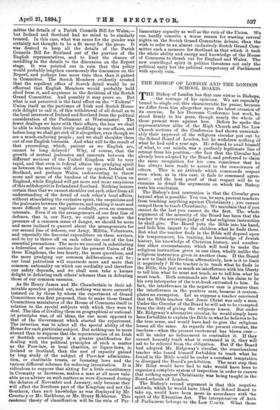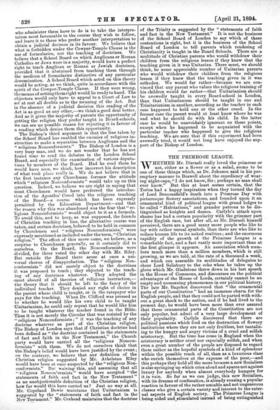THE BISHOP OF LONDON AND THE LONDON SCHOOL BOARD. T HE
Bishop of London has that rare virtue in Bishops, —the courage of his opinions. We are especially bound to single out this characteristic for praise, because we differ from him altogether upon the latest occasion of its exercise. In his Diocesan Conference last week, he stood firmly to his guns, though nearly the whole of those present were against him. Before he spoke the representatives alike of the High Church and the Low Church sections of the Conference had shown unmistak- ably their approval of the religious circular put out by the School Board of London, but he withdrew nothing of what he had said a year ago. He refused to avail himself of what, to our minds, was a perfectly legitimate line of retreat from his position,—the fact that the Circular had already been adopted by the Board, and preferred to claim the same recognition for his own conscience that he has always been ready to accord to the consciences of others. This is an attitude which commands respect even when, as in this case, it fails to command agree- ment; and the best proof of that respect will be to examine in detail the arguments on which the Bishop rests his conclusion.
The Bishop's first contention is that the Circular goes beyond what is possible. You can, he says, prevent teachers from teaching anything against Christianity ; you cannot compel them to teach Christianity. We maintain that if you cannot do the last you cannot do the first. The whole argument of the minority of the Board has been that the teacher is the sovereign judge of what religious instruction he shall give. The Board puts the Bible into his hand, and bids him impart to the children what he finds there. But what the teacher finds in the Bible will depend upon his temperament, his training, his knowledge of Jewish history, his knowledge of Christian history, and number- less other circumstances, which will tend to make the religious instruction given in one class, wholly unlike the religious instruction given in another class. If the Board is not to limit this freedom affirmatively, how is it to limit it negatively ? If the teacher is to teach what he finds in the Bible, it is just as much an interference with his liberty to tell him what he must not teach, as to tell him what he must teach. Both commands are fatal to his claim to be his own interpreter of the text-book entrusted to him. In fact, the interference in the negative case is greater than the interference in the positive case, because it contem- plates no exemption. Let us suppose a teacher convinced that the Bible teaches that Jesus Christ was only a man. Under the Circular of the Board he will ask to be exempted from the duty of giving the religious lesson. But under Mr. Ridgeway's alternative circular, he would simply have been forbidden to explain the Bible in what he believes to be the true sense, and would have had to give the religious lesson all the same. As regards the present circular, the teachers—when the present excitement has blown over— will be under no inducement to contradict it. If they cannot honestly teach what is contained in it, they will ask to be relieved from the obligation. But if the Board had adopted Mr. Ridgeway's circular, the conscientious teacher who found himself forbidden to teach what he found in the Bible would be under a constant temptation to disregard the Board's prohibition. The next step that Mr. Riley would have had to take would have been to organise a complete system of inspection in order to ensure that nothing against Christianity was being taught in the Board-schools of London.
The Bishop's second argument is that this negative attitude, which he would have liked the School Board to take up, would have been more in accordance with the spirit of the Education Act. The interpretation of Acts of Parliament belongs to the Law Ciurts. What those who administer them have to do is to take the interpre- tation most favourable to the course they wish to follow, and leave it to those who prefer another interpretation to obtain a judicial decision in its favour. We believe that what is forbidden under the Cowper-Temple Clause is the use of formularies, not the teaching of doctrines. We believe that a School Board on which Anglicans or Roman Catholics or Jews were in a majority, would have a perfect right to teach Anglican or Roman or Jewish doctrines, provided that it abstained from teaching them through the medium of formularies distinctive of any particular denomination. A School Board which acted on this theory would be acting, as we think, quite in accordance with the spirit of the Cowper-Temple Clause. If they were wrong, the means of setting them right would lie ready to hand. The objectors would only have to appeal to a Court of Law to set at rest all doubts as to the meaning of the Act. But in the absence of a judicial decision this reading of the Act is as good as any other,—we think a good deal better. And as it gives the majority of parents the opportunity of getting the religion they prefer taught in Board-schools, we can see no possible reason for rejecting it in favour of a reading which denies them this opportunity. The Bishop's third argument is that the line taken by the School Board has enabled the enemies of religious in- struction to make a separation between Anglicans and the "religious Nonconformists." The Bishop of London is a very busy man, and we do not wonder that he has not found time to read the debates in the London School Board, and especially the examination of various deputa- tions by members of the Board. Had he read them he would have seen, we think, how incorrect his description of what took place really is. We do not believe that in the first instance any Churchman foresaw the attitude which "religious Nonconformists" would take up on this question. Indeed, we believe we are right in saying that most Churchmen would have preferred the introduc- tion of the Apostles' Creed into the religious teaching of the Board—a course which has been expressly permitted by the Education Department—and that the reason why this was abandoned was the fear that " re- ligious Nonconformists" would object to it as a formula. To avoid this, and to keep, as was supposed, the friends of Christian teaching in line, the alternative course was -taken, and certain doctrines, believed to be held in common by Churchmen and "religious Nonconformists," were .expressly mentioned as included under the term, "Christian religion." The effect of this move came, we believe, as a surprise to Churchmen generally, as it certainly did to ourselves. On the Board, the Nonconformists were .divided, for three voted the other day with Mr. Riley. But outside the Board there arose at once a uni- versal chorus of disapprobation. The "religious Non- conformists" did not merely object to the doctrines it was proposed to teach ; they objected to the teach- ing of any doctrines whatever. They adopted the .most absurd of all theories of religious instruction,— the theory that it should be left to the fancy of the individual teacher. They denied any right of choice in the parent whose child is taught, or in the ratepayer who pays for the teaching. When Dr. Clifford was pressed as to whether he would like his own child to be taught Unitarianism, he could only repeat that he would like him to be taught whatever the teacher found in the Bible. -Thus it is not merely the Circular that was resisted by the ." religious Nonconformists ; " it was the teaching of any doctrine whatever as part of the Christian religion. 'The Bishop of London says that if Christian doctrine had been defined as "the doctrine contained in the statements of fact and faith in the New Testament," the Church party would have carried all the "religious Noncon- formists " with them. We do not ourselves think that the Bishop's belief would have been justified by the event; on the contrary, we believe that any definition of the Christian religion suggested by Mr. Athelstan Riley would have been at once suspected by the "religious Non- conformists." But waiving this, and assuming that all "religious Nonconcormists " would have accepted "the statements of faith and fact in the New Testament" as an unobjectionable definition of the Christian religion, how far would this have carried us ? Just no way at all. Mr.' Copeland Bowie maintains that Unitarianism is suggested by the "statements of faith and fact in the New Testament." Mr. Coxhead maintains that the doctrine of the Trinity is suggested by the "statements of faith and fact in the New Testament." It is not the business of the School Board of London to say which of these contentions is right, but it is the business of the School Board of London to tell parents which rendering of Christianity is taught in the Board Schools. There are a multitude of Christian parents who would withdraw their children from the religious lesson if they knew that the teaching given in it was Unitarian. There must, we should think, be some appreciable number of Unitarian parents who would withdraw their children from the religious lesson if they knew that the teaching given in it was orthodox. We would far rather—because we are con- vinced that any parent who values the religious training of his children would far rather—that Unitarianism should be avowedly taught in every Board-school in London, than that Unitarianism should be taught in one and Trinitarianism in another, according as the teacher in each case happened to hold one or the other creed.. In the former case the parent would at least know where he was and what he should do with his child. In the latter case he would be unavoidably ignorant on these points, except when he happened to be acquainted with the particular teacher who happened to give the religious teaching. We are sure that if this experiment had been avowedly tried, it would not long have enjoyed the sup- port of the Bishop of London.



































 Previous page
Previous page